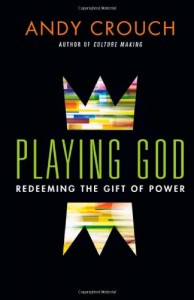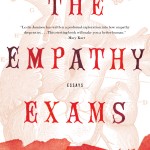Tramp. Cad. Lily-livered. Townie. Every generation has their put-downs, but for a certain subset of the population today, the best way to insult someone is by calling her “privileged.” In a hyper self-conscious culture, many millennials are wracked with guilt over their white middle-class upbringing, $30k-a-year education, and relative economic security. This is, no doubt, from where the sudden popularity of social justice causes and philanthropic NGOs springs: we’re eager to assuage our guilt by digging wells and freeing slaves.
But we can’t simply ignore or disclaim our privilege. It is a form of power, and we need to be careful how we use it. Power gets a bad rap because we associate it with the axiom that “power corrupts, and absolute power corrupts absolutely.” But in his latest book Playing God, Christianity Today’s Andy Crouch argues that power is not a zero-sum quantity, but rather a gift that can increase as it is shared with others. Playing God is Crouch’s effort to move power to the center of our understanding of our interactions with the world.
The idea is that “love transfigures power.” The Nietzschean view of power as distilled violence is power at its worst, a perversion of its true nature. We must stop thinking about power as being exclusive to dictators and CEOs and understand how it flows around us all the time. By defining power instead as “the ability to make something of the world,” Crouch gives his book an extremely broad scope. Indeed, in Playing God he touches on everything from washing dishes and spanking children to short term mission trips and the gay rights movement. And, of course, there’s privilege. “At its worst,” Crouch writes, “privilege is blindness, allowing us to blithely go on in our god playing, not even aware of the insults to image bearers that happen under our noses every day.” But that’s only a corruption of a wider phenomenon. In itself, privilege is “the ongoing benefit of past successful exercises of power.” And like power more generally, privilege can—and must—be stewarded in responsible ways.
Perhaps Crouch’s simplest illustration is that of a parent and child. A baby is helpless at birth, completely under the power of his parents. If we follow the traditional logic about power, this is a bad situation for the baby. “In fact,” as Crouch reminds us, “so far from being absolutely corrupted by the absolute power parenthood confers over a new human being, many parents find themselves awakening to new capacities for resilience, sacrifice and servanthood that they did not know they had before.”
Out of all this, the timeliest aspect of Playing God is its attention to social justice and how American Christians both empower and dispossess people around the world in attempts to help them. Rather than blindly striking at world ills, Crouch encourages us to understand idolatry and injustices as the negative consequences of ill-used power. If we “play god” by swooping in and saving the day, we make ourselves into idols, rather than restoring the image-bearing capabilities of the people we seek to help.
But if we’re not meant to go on campaigns to “save the world,” how can we have an impact beyond our own lifetime and immediate community? The answer is institutions. As Crouch puts it, “The way that cultural change becomes widely available and influential is through a process of institutionalization, in which cultural innovation becomes available to society through the creation of artifacts, arenas, rules, and roles.”
For the average twenty-something, institutional affiliations are changing constantly. Employment, church denomination, grocery store, state citizenship, news source, Internet browser—none of it stays the same for long. We move quickly through the world trying to find our “calling,” and there are few institutions we invest in or feel any loyalty to. And why would we want to? Institutions are the stale, bureaucratic leavings of our parents; they perpetuate privilege and the unequal distributions of power. But like power, institutions have been distorted from their true purpose. In the best institutions, people at every level flourish, not just those at the top.
In order to bring this widespread flourishing about, institutions need trustees to safeguard them, people “who can be trusted to preserve and provide for what is best, most suited to image bearing, and to weed out what is worst, most implicated in idolatry and injustice.” Institutions can outlast us and carry the goodness of God from generation to generation, but they need to be created and supported by people with great vision.
There is something in Playing God both for those who are sensitive about their privilege and for those who feel hope- less to change anything. The reality is somewhere in the middle, and Playing God sets the stage for action, challenging us to acknowledge and use our power to increase mankind’s capacity for image bearing.

















